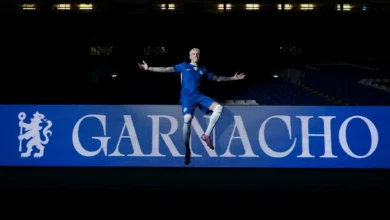
- Mykhailo Mudryk tested positive for meldonium after international duty, leading to a provisional suspension.
- Mudryk denies knowingly taking banned substances, awaiting further testing of his 'B' sample.
- Doping bans typically range from two to four years, with appeals potentially reducing sanctions.
Mykhailo Mudryk’s £62 million move to Chelsea was a clear sign of the club’s ambition. The Ukrainian winger was supposed to be one of the stars of Chelsea’s new era, a symbol of their post-Abramovich transformation.
But now, just under two years later, Mudryk is at the center of a doping scandal that has thrown his future into doubt.
Here is all you need to know about the Mudryk scandal.
Mudryk’s Doping Scandal: The breakdown
The story began with a routine drug test. In November, during international duty, Mudryk tested positive for meldonium, a substance banned by the World Anti-Doping Agency (WADA).
This has led to his provisional suspension by the Football Association (FA), and Chelsea, along with the player, have been forced to deal with the fallout.
Mudryk has strongly denied knowingly taking any banned substances, and both Chelsea and the player issued statements affirming that he did not intentionally violate any rules.
On Instagram, Mudryk expressed his shock: “I have never knowingly used any banned substances or broken any rules,” he said. “I’m working closely with my team to investigate how this could have happened. I know that I’ve done nothing wrong and remain hopeful I’ll be back on the pitch soon.”
Mudryk’s last appearance for Chelsea was in late November, when he scored in a 2-0 win over Heidenheim in the UEFA Conference League.
Since then, he’s been absent from the first team, with coach Enzo Maresca either not specifying a reason for his absence or attributing it to illness.
What is Meldonium and Why Does it Matter?
Meldonium is a heart disease drug that was banned by WADA in 2016. Originally developed in the Soviet Union, meldonium is used to treat ischemia, a condition where blood flow to organs or tissues is restricted.
It also improves exercise capacity and metabolism, which is why athletes have been known to use it to enhance performance.
The most famous case of meldonium use was that of Russian tennis star Maria Sharapova. In 2016, she tested positive for the drug during the Australian Open, leading to a two-year ban.
Sharapova explained that she had been using the drug for years on her doctor’s recommendation and wasn’t aware that it had been added to WADA’s list of banned substances.
While her ban was reduced to 15 months, the incident sparked widespread controversy.
Before the ban, meldonium was commonly used by Eastern European athletes, which led to a doping scandal in 2016 when several Russian ice hockey players tested positive for the substance.
The FA’s Role and What Happens Next
In the UK, UK Anti-Doping (UKAD) is responsible for conducting drug tests for Premier League players, while the FA has the final say in any disciplinary actions.
When Mudryk’s ‘A’ sample returned an adverse finding, he was placed under provisional suspension. Chelsea and Mudryk now await the results of the ‘B’ sample, which could either confirm or clear the initial findings.
The FA’s rules are strict: players are responsible for any banned substances found in their bodies, regardless of how they got there.
The testing procedure is random and unannounced, and players can be tested several times throughout the season.
In Mudryk’s case, his test came after a string of international matches, including UEFA Nations League fixtures against Georgia and Albania.
Doping in Football: How Rare is it?
Doping in football is not as common as in other sports like cycling, but it does happen. The most frequent violations are related to recreational drugs rather than performance-enhancers.
High-profile cases in recent years have included former Chelsea players Adrian Mutu and Mark Bosnich, who were banned for using cocaine.
Performance-enhancing drugs are rarer but not unheard of. In 2021, for example, Manchester United’s Andre Onana was banned after testing positive for a diuretic, while Paul Pogba faced a four-year ban for a failed test, though that was later reduced to 18 months.
The idea of a footballer taking meldonium, however, remains relatively uncommon. The fact that Mudryk, a player with everything to lose, has tested positive for a banned substance is a troubling development, but it’s far from the end of his career.
The Punishment: What Could Happen?
If the ‘B’ sample also comes back positive, Mudryk could face a suspension ranging from two to four years.
However, the outcome could be less severe if Mudryk can show no significant fault or negligence in the matter. It’s worth noting that the court of arbitration has sometimes reduced bans if the athlete can demonstrate they weren’t intentionally cheating.
Chelsea is currently standing by their player, and the club’s stance is clear: they’ll back Mudryk as long as there is no proof of intentional wrongdoing.
But the situation remains fluid, and Chelsea may be forced to make some tough decisions depending on the results of the ongoing investigation.
The club has precedent for acting decisively in doping cases. When Adrian Mutu tested positive for cocaine, Chelsea terminated his contract and sought damages, ultimately winning £14 million from the player in court.
While Mudryk’s case is different, the club could potentially go down the same route if the findings lead to a long-term suspension or ban.
Mudryk’s Future at Chelsea
Should Mudryk face a lengthy suspension, it will be a blow to Chelsea, especially considering the investment they’ve made in him.
The winger is one of their most expensive signings, and despite a difficult start to life in the Premier League, he remains an important part of the club’s plans moving forward.
However, if the situation worsens, Chelsea might be forced to look at options for his future, even if that means parting ways with the player.
Chelsea’s current owners may be more cautious in their approach than the previous regime, who acted decisively when faced with similar issues. But if Mudryk is found guilty, Chelsea might have little choice but to sever ties.
For now, it’s a waiting game for Mudryk, Chelsea, and football fans alike. The situation remains in flux, and while the player maintains his innocence, the possibility of a lengthy suspension could mark a dark chapter in his career.
As the investigation continues, the football world watches closely to see how this story unfolds.





